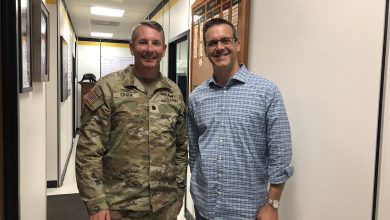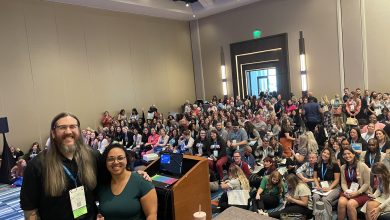Florida Tech School of Psychology Students Present in Colorado
By Marshall Jones, M.S., Director, College of Psychology and Liberal Arts Online Programs
Members of the Center for Applied Criminal Case Analysis (CACCA) in the School of Psychology attended the Academy of Criminal Justice Science’s (ACJS) annual conference in Denver, Colorado, in late March. CACCA was founded in the fall of 2014 to further facilitate academic-practitioner research opportunities. Members of the team presented one full panel presentation, two independent papers, two open seminars and five posters. The main emphasis of these presentations was on research conducted to address The National Coordination Committee on the American Indian/Alaska Native Sexual Assault: Nurse Examiner Sexual Assault Response Team Initiative Report put forth to U.S. Attorney General Eric Holder.
The questions proposed by the report include identifying the characteristics of victim-offender relationships in sexual assault cases in Indian Country (IC). It also seeks to quantify the various kinds of sexual assaults that occur in IC. Current literature on the topic is lacking support in empirical studies due to the fact that most studies are based on self-report surveys. The research done by CACCA countered these claims by using federal criminal case files garnered through a Memorandum of Understanding (MOU) with the Federal Bureau of Investigation (FBI). The academic-practitioner relationship is beneficial to both parties as it expands the limited amount of current research while providing practitioners with useful tools and information to better serve the population.
Some of the research topics addressing these points that were presented at the conference included a panel which discussed general information surrounding IC including jurisdiction, the types of sexual assault that occur, victim-offender relationships, and factors considered in whether or not the U.S. Attorney’s Office decides to decline a case. The seminars spoke to the importance of developing academic-practitioner relationships as well as establishing a team dynamic before introduction to a novel task with techniques such as a leaderless work group.
The posters discussed a wide array of topics, including the use of alcohol and weapons by the offender in sexual assault cases. Some of the poster topics expanded on various points that were presented in the larger panel talk, including a look at comparing CACCA’s research directly with other widely accepted research in the field. The team continues to work with exploratory data analysis of the data collected and is currently working toward expanding the dataset through new partnerships. In addition, CACCA plans to submit manuscripts containing results, some of which are to be unveiled at ACJS, later this year.





